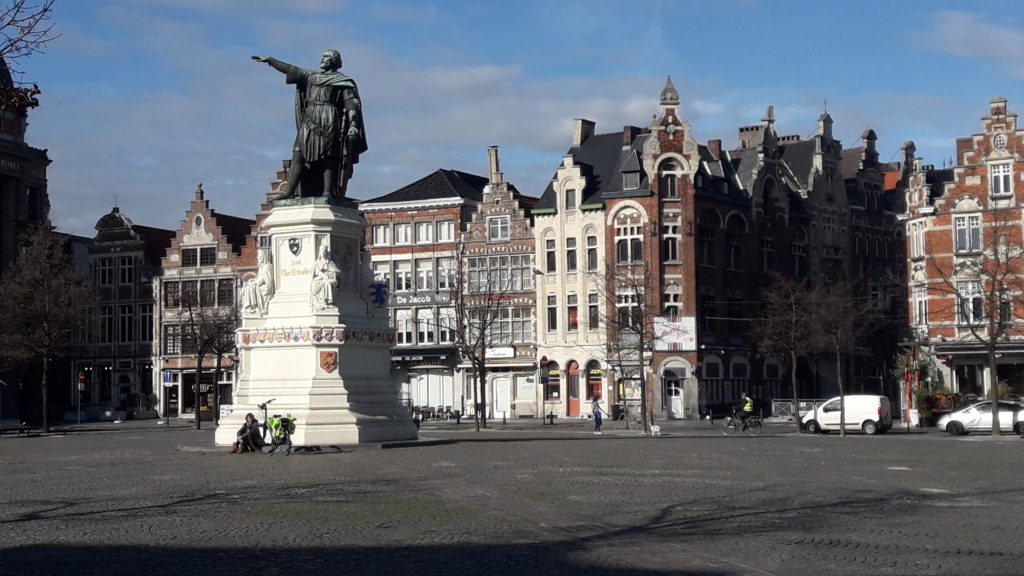Robust health systems are society’s first line of defence against pandemics
Belgium has long been written off as a dysfunctional and failing state, yet its response to the COVID-19 pandemic has been surprisingly functional and successful. This highlights how effective healthcare acts as society's immune system.

Wednesday 6 May 2020
With its chronic, record-breaking inability to form governing coalitions and its crumbling federal government, Belgium has long been written off as a dysfunctional failure. Although the country is regularly described as a “surreal state” or the world's most prosperous “failed state” in the foreign media, citizens have become increasingly resigned to the deadlock and the Byzantine machinations of the political elite, often joking that the country works better without a government.
When a COVID-19 epidemic broke out in Italy and threatened to spread across Europe, there were serious concerns that Belgium's polarised parliament, fragmented government (the country has nine federal and regional health ministers) and minority caretaker government would prove ill-equipped to deal with the acute public health crisis hurtling towards the country.
Despite the political crisis paralysing the country, most of the squabbling parties decided to put public health above partisanship, exhibiting the pragmatism that Belgium used to be famed for. The parliament awarded acting Prime Minister Sophie Wilmès, along with the National Security Council, enough emergency powers to tackle the looming crisis.
Wilmès, who was appointed to head the caretaker government in October 2019, has been thrust centre stage of the greatest crisis for generations. Her cool-headed, understated, calming and inclusive performance, which contrasts starkly with the erratic and bombastic style of her British counterpart Boris Johnson, has won plaudits, including from the normally sober and reserved Financial Times, though she has faced some domestic criticism for allegedly being too absent from the public eye.
The Belgian response has been so decisive and, to date, effective that it has taken many by surprise, not least the Belgians themselves.
So, what is behind Belgium's relative success in handling the epidemic?
One important factor was the speed and timeliness of the response. Despite some early dithering, Belgium went into lockdown just in the nick of time. The unfolding calamity in Italy at the time focused minds and helped decide the undecided.
Another, and possibly the most crucial factor, was Belgium's highly developed healthcare infrastructure, which, like a collective immune system, has bolstered society's ability to fight off the virus.
Not only does Belgium's health sector rank among the best in Europe, vitally, it already possessed a very high concentration of hospital beds and critical care units, enabling it to handle the huge growth in patients requiring intensive care with relatively few adjustments.
In fact, unlike quite a few other countries whose health systems are overwhelmed by the pandemic, Belgium has had plenty of spare critical care capacity throughout the crisis, even when the epidemic was at its peak.
The major weak point and failure has been nursing and residential homes for the elderly, where an initial shortage of testing kits meant too many cases went undetected. Of the nearly 8,000 deaths so far attributed to COVID-19 over half have been in care home for the aged.
The way in which coronavirus casualties are recorded has placed Belgium near the top (for now) of the global league for COVID-19 deaths per million. However, as experts have explained, Belgium is the only country which currently records suspected deaths outside hospitals, which represent 82% of the recorded deaths in care homes. This inflates the death rate in Belgium compared with other hard-hit countries.
Other factors at play include the country's high population density, its relatively old population and comparatively low levels of testing compared with the most successful countries like Germany and South Korea.

Around the world, lockdowns and social distancing are proving the most challenging measures to implement. Although Belgium has implemented what has been referred to as a “lockdown light”, crucially, it involved the closing down of all but the most crucial economic activities, which was not the case in Italy until late into the crisis.
It also allowed people some time outdoors, which appears to have been more successful than in some countries which imposed a full lockdown. This could be partly because allowing people to go out and exercise or walk responsibly is not only good for their health, but also gives them the chance to let off some steam, enabling them to stick to the other restrictions with greater ease.
And this has largely been the case. Despite some early reports of occasional “lockdown parties ” and some people escaping restrictions by crossing into neighbouring Holland, the public has generally and spontaneously abided by the social distancing rules with minimal need for policing, although the Easter weekend saw a spike in violations, raising fears at the time that this could lead to a new peak. That said, the public was sometimes ahead of the government, with many businesses and shops shuttering before the government officially ordered it.
Even though Belgium was already a society in which personal space was respected, seeing how quickly people have integrated social distancing into their daily routines is impressive. In the few shops that remain open, people were already standing and queuing well apart from each other before markers were put down on the floors. In open-air public spaces, people were also generally distancing themselves from other pedestrians.
Employing good democratic governance, persuasion and consensus-building, rather than coercion, has helped this widespread compliance, even if the far-right and Flemish nationalists have been making unhelpful noises. This has also been accompanied by a cross-partisan commitment to following scientific advice.
While certain politicians in other countries, such as US President Donald Trump, have tried to upstage or contradict scientists, effectively politicising the crisis, the Belgian government's measured response has not only been led by science, but also relevant experts have often been given greater prominence in the media than political figures.
The daily press briefings delivered by virologist Steven Van Gucht of the National Crisis Centre have become essential viewing for ordinary Belgians. Fellow virologist and epidemiologist Marc Van Ranst has become an almost daily fixture in evening current affairs programmes, where he has explained the reasoning behind each new measure and discussed possible future developments.
Another essential ingredient in the success of these restrictions was the fact that Belgium is an affluent society with a decent, albeit worsening, social security and solidarity system.
The Belgian state, along with many businesses and organisations, decided pretty early on that preserving human life and preventing the uncontrolled spread of the virus was worth taking a major economic hit. Although this is causing hardship for many vulnerable people and smaller businesses, the shock is being softened by an emergency aid package that includes the deferment of tax, mortgage and bank payments, as well as giving workers in vulnerable sectors temporary unemployment benefits.
These efforts appear to be paying off gradually, with epidemiologists confirming that a downward trend is now in motion, leading to a gradual loosening of restrictions, which has proven a challenging undertaking that appears to be favouring restarting the economy over reviving social contacts, especially for children.
However, success still hinges on how well the population continues to stick to the rules, experts emphasise.
The situation in Belgium highlights the critical importance of investing heavily in healthcare and social safety nets in good times, not just during emergencies. One only hopes that once the pandemic is over, politicians, including in Belgium, will recall this lesson and boost investment in these increasingly neglected areas, despite the inevitable economic crisis which will follow.
What the case of Belgium and other wealthy European countries also underlines is that such a robust response to the pandemic is a luxury which poorer countries cannot afford if and when they are hit by this coronavirus.
This raises the urgent need for global solidarity. It is imperative that a global COVID-19 fund is established to help poorer countries deal with the medical and economic challenges posed by the pandemic, as well as a mobile rapid response “army” of medical professionals that can be sent to coronavirus hotspots as and when they appear.
____
This is the updated version of an article which was published by Al Jazeera on 13 April 2020.

